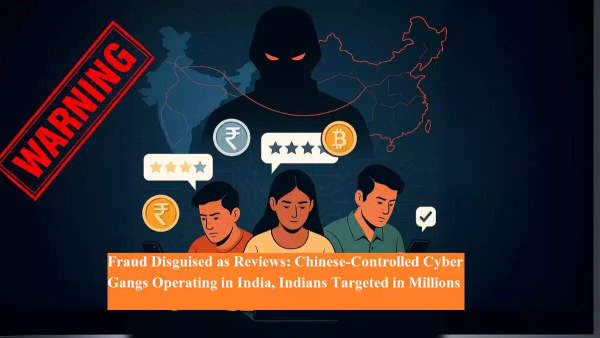

A dangerous cybercrime network with international roots has been uncovered by the Delhi Police Cyber Cell, exposing a racket where young Indians are lured by Chinese handlers into online scams. These operations, masked behind fake online tasks like writing reviews, have siphoned crores of rupees from Indian citizens, using encrypted apps and cryptocurrency transactions. Authorities now warn that this is not a simple case of online fraud—it’s a well-orchestrated international cybercrime syndicate.
The Modus Operandi: How Indian Youth Are TrappedAccording to a report by PTI, Delhi Police's IFSO Unit (Intelligence Fusion and Strategic Operations) and cyber units across 15 districts have unearthed a pattern. Chinese handlers, using encrypted social media platforms like Telegram, WhatsApp, and other chat apps, contact Indian youth with lucrative job offers.
These “jobs” often begin innocently:
Posting fake hotel reviews
Completing small online tasks
Providing SIM cards, bank accounts, or app access
In return, the youths are promised handsome payouts. But as they get further involved, they are unknowingly assisting in online scams, and some even begin conducting frauds themselves.
Shocking Cases: Cryptocurrency & Nepal LinkIn a recent bust, three Indian youths—Mahendra Singh Rajawat, Arif Khan, and Lakshmi Narayan Vaish—were arrested. Investigations revealed that they were in direct contact with a Chinese national, and helped launder approximately ₹15.8 lakh by converting it to USDT (a form of cryptocurrency) and transferring it to Chinese-controlled wallets.
Another shocking case from Punjab involved two men—Pawan and Mankirat—who scammed a woman of ₹21 lakh. Their operations were also linked to Chinese handlers, and they had even traveled to Nepal to set up and execute their fraud schemes.
Victim Profile & The Fraud ChainCybercriminals target regular Indians, promising:
Fast income through app-based tasks
Bonus rewards for writing online reviews
Help with credit score improvement
“Unfreezing” of bank accounts via payment links
Offers related to fake government schemes
Once trust is gained, the fraudsters extract large amounts of money under the pretense of processing fees, unlocking accounts, or handling crypto wallets.
Why This Is AlarmingOver 15 cases per month are being registered in Delhi alone
Criminals operate through international networks (China, Nepal, and Southeast Asia)
Crypto payments and encrypted apps make tracking harder
Youth unemployment and lack of awareness are making Indian youngsters easy prey
According to Delhi Police, the structure of this fraud network is highly organized, with layered operations that make it difficult to trace the mastermind immediately.
How You Can Stay SafeHere are 5 essential steps to avoid falling victim to such cyber scams:
Never share your SIM card, banking information, or KYC documents with unknown individuals or online job providers.
Be suspicious of any scheme promising quick money, crypto returns, or international payments.
Avoid clicking on unknown links, downloading unverified apps, or engaging in random Telegram groups.
Educate friends and family, especially young students, about such scams.
Report cybercrime immediately via 1930 or the official portal www.cybercrime.gov.in.
The Delhi Police Cyber Cell is working on:
Tracing international handlers
Disrupting crypto payment chains
Coordinating with inter-agency cyber teams across states
Educating the public through social media awareness campaigns
According to senior officials, breaking the spine of this international racket is now a top priority.
Conclusion:
What may start as an innocent task like writing a review can quickly spiral into serious cybercrime. The rise of Chinese-backed online fraud in India has become a national concern, and as scammers get smarter, so must citizens. The only way to protect yourself and others is through vigilance, digital awareness, and prompt reporting.